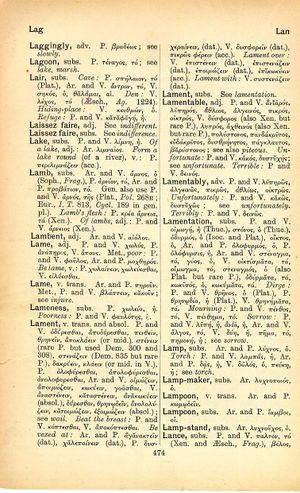lamentation
διὸ δὴ πᾶς ἀνὴρ σπουδαῖος τῶν ὄντων σπουδαίων πέρι πολλοῦ δεῖ μὴ γράψας ποτὲ ἐν ἀνθρώποις εἰς φθόνον καὶ ἀπορίαν καταβαλεῖ → And this is the reason why every serious man in dealing with really serious subjects carefully avoids writing, lest thereby he may possibly cast them as a prey to the envy and stupidity of the public | Therefore every man of worth, when dealing with matters of worth, will be far from exposing them to ill feeling and misunderstanding among men by committing them to writing
English > Greek (Woodhouse)
substantive
P. and V. οἰμωγή, ἡ (Thuc.), στόνος, ὁ (Thuc.), ὀδυρμός, ὁ (Isocrates and Plato), οἶκτος, ὁ, Ar. and P. ὀλοφυρμός, ὁ, P. ὀλόφυρσις, ἡ, Ar. and V. στέναγμα, τό, γόος, ὁ, V. οἰκτίσματα, τά, οἴμωγμα, τό, στεναγμός, ὁ (also Plato but rare P.), ὀδύρματα, τά, κωκυτός, ὁ, κωκύματα, τά.
dirge: P. and V. θρῆνος, ὁ (Plato), P. θρηνῳδία, ἡ (Plato), V. θρηνήματα, τά.
mourning: P. and V. πένθος, τό, V. πένθημα, τό.
sorrow: P. and V. λύπη, ἡ, ἀνία, ἡ, Ar. and V. ἄλγος, τό, V. δύη. ἡ, πῆμα, τό, πημονή, ἡ; see sorrow.

